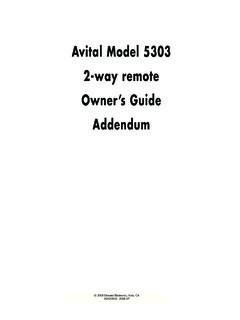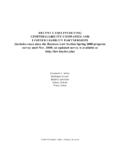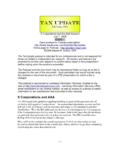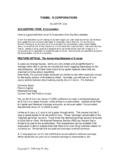Transcription of THE ACCRA AGENDA FOR ACTION (AAA) - OECD.org
1 IT ISWHAT IT PROPOSESIn ACCRA , Ghana, on 4 September 2008 , developed and developing countries came together and endorsed the ACCRA AGENDA for ACTION (AAA). In doing so, developing countries committed to taking control of their own future, donors pledged to co-ordinate better amongst themselves, and all agreed to be more accountable to each other and to their citizens. The ACCRA AGENDA for ACTION is the product of an unprecedented alliance: more than 80 developing countries, all OECD donors and some 3 000 civil society organisations from around the world joined representatives of emerging economies, United Nations and multilateral institutions and global funds in the negotiations leading up to and taking place during the ACCRA meeting.
2 The AAA seeks to strengthen and deepen implementation of the Paris Declaration on Aid Effectiveness (the Paris Declaration). Prepared through a broad-based process of dialogue at both country and international levels, it takes stock of progress on the commitments of the Paris Declaration and sets the AGENDA for accelerating progress to reach the agreed targets by 2010 (see accompanying summary of the Paris Declaration).The AAA draws from strong evidence of what is and is not working gathered primarily from a 2008 monitoring survey and an evaluation exercise on the implementation of the Paris Declaration. To complete the survey, all donor countries of the OECD Development Assistance Committee (DAC) and 54 developing countries contributed information on work towards meeting the targets outlined in the Paris Declaration.
3 The evaluation exercise was conducted as an independent, cross-country assessment of how increased aid effectiveness contributes to meeting development objectives. THE ACCRA AGENDA FOR ACTIONTHE ACCRA AGENDA FOR ACTION (AAA)The AAA hinges on three main themes: Ownership: Countries determine their own development strategies by playing a more active role in designing development policies, and take a stronger leadership role in co-ordinating aid. Donors more consequently use existing fiduciary and procurement systems to deliver aid. Inclusive partnerships in which all partners not only DAC donors and developing countries but also new donors, foundations and civil society participate fully Delivering results that will have real and measurable impact on developmentThe AAA calls on donors to respect local priorities while encouraging developing countries to consult fully with their parliaments and civil society.
4 Capacity development to build the ability of countries to manage their own futures is at the heart of the AAA, with an emphasis on ensuring that countries set their own priorities for where they need to build their capacity. The AAA recognises the value of co-operation that reaches beyond traditional aid arrangements, such as among developing and middle-income countries. It stresses the fundamental, independent role of civil society in engaging citizens. It emphasises the need to follow accepted principles of good international engagement in fragile states. It acknowledges the need for reliable data at the national level that can be used to develop and implement development strategies. And it stresses the value of sound, country-based ACTION plans that are appropriately and regularly monitored.
5 In doing all this, the AAA redefines the relationship between donors, developing countries and their citizens. AAA CALL TO ACTION CIVIL SOCIETY Civil society organisations (CSOs) should play a dynamic role in making citizens concerns and needs heard. CSOs should help ensure that donors and developing countries fulfil their commitments. COUNTRY SYSTEMS When implementing their aid programmes, donors should use developing countries own fiduciary systems. Developing countries should strengthen their own administrative and fiduciary systems. FRAGMENTATION Donors should improve their co-ordination and avoid duplicated efforts thereby lowering costs. Donors should work together to balance their programmes so that all countries receive enough aid.
6 UNTYING AID Donors should increase the value for money of aid by continuing to untie it giving recipients the option of choosing where and from whom they will contract goods and services and by promoting the use of local and regional procurement. ACCOUNTABILITY Developing countries should help parliaments keep track of their aid programmes by encouraging greater transparency in public financial management. Donors should disclose regular, detailed information on how much they invest, when they invest it, and where and whenever available, the results of their investments. CONDITIONALITY Recipient countries should be able to determine the conditions attached to the way aid funds are spent. Donors and developing countries should work from a small set of mutually agreed conditions, and make all these conditions public.
7 PREDICTABILITY Developing countries should strengthen their capacities in budget planning. Donors should provide developing countries with regular information on how much aid they can expect, and when they can expect to receive it.

















